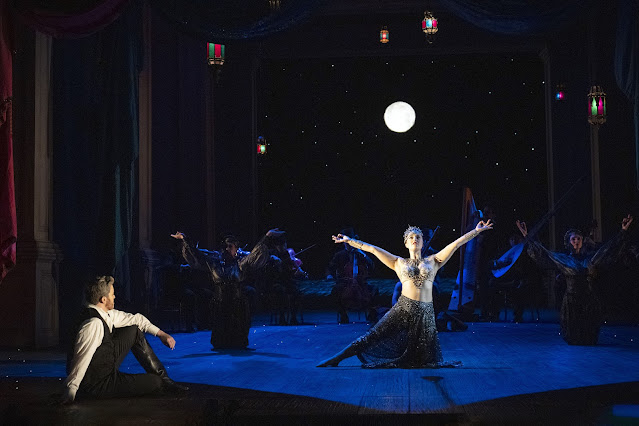 |
| Handel: Giulio Cesare – Aryeh Nussbaum Cohen, Louise Alder – Glyndebourne, 2024 (Photo: © Richard Hubert Smith) |
Handel: Giulio Cesare in Egitto; Aryeh Nussbaum Cohen, Louise Alder, Beth Taylor, Svetlina Stoyanova, Cameron Shahbazi, director: David McVicar, Orchestra of the Age of Enlightenment, Laurence Cummings; Glyndebourne
28 June 2024
Nearly 20 years old, McVicar’s iconic production returns as vivid and vibrant as ever, with superb performances from a young cast
Amazingly, David McVicar’s production of Handel’s Giulio Cesare at Glyndebourne will be 20 years old next year. It debuted in 2005, with Sarah Connolly and Danielle de Niese, returning in 2006 (with David Daniels and Danielle de Niese) and in 2009 (with Sarah Connolly and Danielle de Niese). Now, after something of a gap, it is back as vivid and vigorous as ever with a young new cast.
We caught the second performance of the 2024 revival of David McVicar’s production of Handel’s Giulio Cesare at Glyndebourne on Friday 28 June 2024. Giulio Cesare was Aryeh Nussbaum Cohen [who was David in Handel’s Saul at Komische Oper Berlin in 2023, see my review], Cleopatra was Louise Alder [who sang the title role on Arcangelo’s recent recording of Handel’s Theodora, see my review], Cornelia was Beth Taylor, Sesto was Svetlina Stoyanova [who was Ruggiero in Handel’s Alcina at Glyndebourne in 2022, see my review], Tolomeo was Cameron Shahbazi [who was Hamor in Handel’s Jephtha at Covent Garden in 2023, see my review] and Achilla was Luca Tittoto [who sang Saul at the Komische Oper], with Thomas Chenhall as Curio and Ray Chenez as Nireno. Laurence Cummings conducted the Orchestra of the Age of Enlightenment. Sets were by Robert Jones, costumes by Brigitte Reiffenstuel, choreography by Andrew George.
The production takes an admirably expansive view of what is actually a very long opera with a first act lasting just shy of 90 minutes and, correctly, two intervals, none of the arias is trimmed, Nireno got his aria and Achilla got both of his. The second interval is, however, placed after Cleopatra’s ‘Se pietà’, with the scene for Tolomeo, Cornelia, Sesto and Achilla opening the third part.
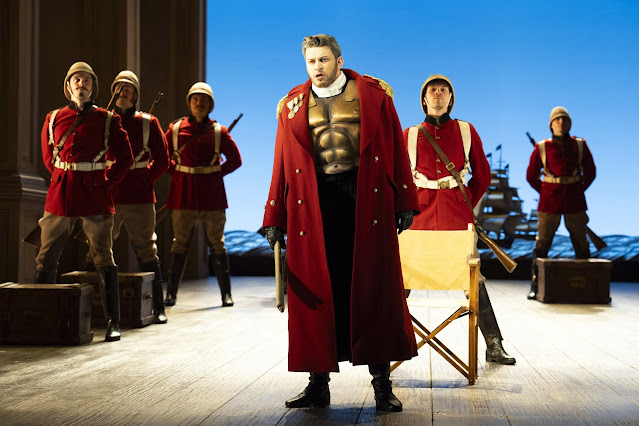 |
| Handel: Giulio Cesare – Aryeh Nussbaum Cohen – Glyndebourne, 2024 (Photo: © Richard Hubert Smith) |
The production sets the action in the context of the British Raj, which gives a firm underpinning for the drama without the need for extensive back history, though Brigitte Reiffenstuel’s costumes, particularly for Cleopatra are rather more playful. Robert Jones’ sets might seem lavish but they are enormously responsive and scene changes happened smoothly and easily, with no awkward waits and only a couple of uses of the drop curtain. This has the admirable effect of allowing Handel’s drama to flow exactly as it ought. Cleopatra’s scene in Act Two where she is supposed to appear enthroned with the muses really did feature the nine musicians on stage, which is something opera companies rarely attempt nowadays, and McVicar keeps largely to the work’s dramaturgy so that exit arias were largely that.
Whilst McVicar does present Handel and his librettist Nicola Haym’s drama pretty much as they intended, McVicar also takes the view that opera seria as a genre is something that needs help if it is to live theatrically. He does this by leavening the drama with humour, the use of the chorus and actors has a stylised sense of the comic to it and choreographer Andrew George’s movement generally had a lightening, leavening effect. Also, in the moments of unfortunate coincidence or suspension of disbelief, to which opera seria is rather prone, if the production did not actually encourage a laugh, it was rather expected. That said, within this playfulness, the characters are taken seriously and their emotions are never lightened.
This playfulness very much centres on the character of Cleopatra. Until we get to ‘Se pieta’, the role is relentlessly choreographed, even ‘V’adoro, pupille’. Louise Alder entered into things with a will, a sense of playful enjoyment radiating from her with never a hint of sending the role up. This Cleopatra was definitely a playful minx, but Alder’s lyric soprano voice is bigger and richer than a mere soubrette and even in the more bravura arias there was a richness and sense of luxury to her singing that hinted at the more serious things to come. Substantial roles like Cleopatra in Baroque opera can be something of a challenge, with the way each aria explores just one or two emotional colours; here, Alder ensured that everything was joined up so we believed in her emotional development. Her superb account of ‘Se pieta’ was moving and believable whilst ‘Piangerò’ was superbly intense, yet ‘Da tempeste’ returned us to the dancing playfulness. All in all, a real triumph.
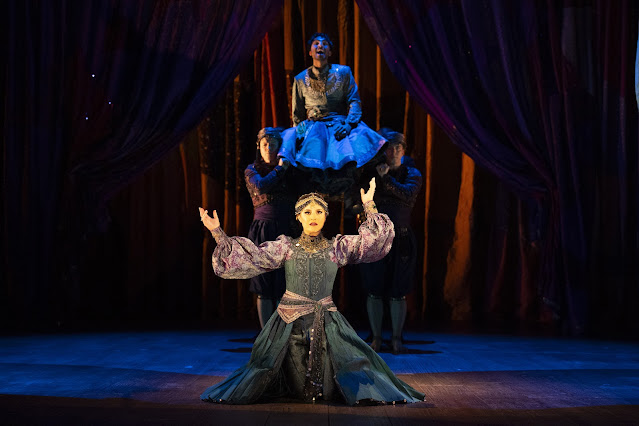 |
| Handel: Giulio Cesare – Cameron Shahbazi, Louise Alder – Glyndebourne, 2024 (Photo: © Richard Hubert Smith) |
Aryeh Nussbaum Cohen made a physically imposing Giulio Cesare, looking very much the conqueror (thought it was unfortunate that his Act One costume of great coat and breast plate looked more cumbersome than imposing), with a voice to match. There was never a hint that the role lies rather low, he produced a lovely even sound from top to bottom. His bravura moments were vividly done with some admirably vibrant passagework, yet in the serious moments such as ‘Alma del gran Pompeo’, Nussbaum Cohen was equally intense in the seriousness. The result was a richly layered portrait of a complex hero. His hunting aria, ‘Va tacito e nascosto’ with its terrific horns was definitely a highlight, whilst the aria at the end of Act Two when he goes off to battle, ‘Al lampo dell’armi’ was a real tour de force, despite McVicar’s desire to send up the G&S element of an aria spending five minutes having the character vigorously leaving. The whole of the Act Three scene where he reappeared from the sea, with its imaginatively mix of arioso, recitative and aria, with finely done and kept the focus really on the character.
Svetlina Stoyanova made an admirably youthful Sesto, both in looks and in the lovely flexibility and fluidity to her voice. This Sesto was touching in his moments of trying to steel himself to be the man his father was as well as having lovely elements of self-doubt. Stoyanova was wonderfully vibrant in the bravura arias, of which Sesto has his fair share, yet she made the quieter ones really intimate. The result was another complex, multi-layered performance that created an appealing character, one where gender almost became irrelevant. As Sesto’s mother, Cornelia, Beth Taylor was equally youthful. No dour matron, she was suitably demure and ladylike, yet also vigorous and highly active. Passionate in her intense reaction to Cameron Shahbazi’s Tolomeo, this was a vibrant and highly active portrait of a character who can sometimes seem a bit passive. Yet when the chips were down, Taylor was profoundly moving and her Act One duet with Stoyanova’s Sesto was definitely a musical highlight.
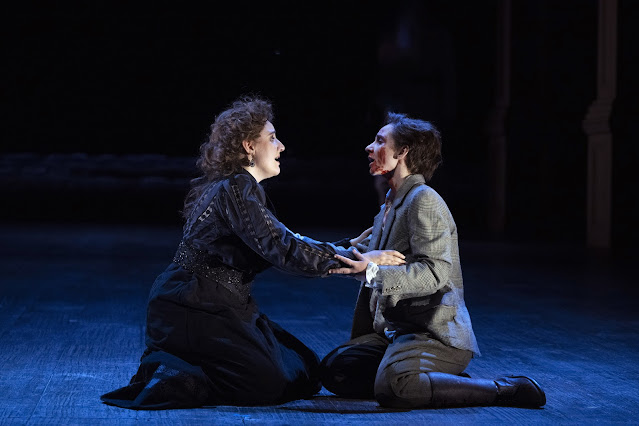 |
| Handel: Giulio Cesare – Beth Taylor, Svetlina Stoyanova – Glyndebourne, 2024 (Photo: © Richard Hubert Smith) |
Cameron Shahbazi was a vividly portrayed Tolomeo, highly coloured yet not too camp, he was believably a ladies’ man though Shahbazi gave this Tolomeo a nice theatricality which emphasised the character’s sheer sliminess and nasty streak. Shahbazi was clearly have a whale of a time, there was a fun element here too, this Tolomeo enjoyed being nasty. Shahbazi sang the role finely too, there was a lot to enjoy musically . As his general, Luca Tittoto brought vigour and dramatic credibility to Achilla’s two arias, making them feel far more than just necessary make-weights.
In this production, Cleopatra’s servant Nireno is played in a scene-stealing comic way and Ray Chenez certainly went to town. Physically adroit, Chenez made Nireno’s antics visually expressive even if they felt, to me, somewhat over the top and a tad overdone. He was appealing in Nireno’s aria, another one of those that can easily feel like a make-weight. In the small role of Curio (who never gets an aria, whichever version of the opera you perform), Thomas Chenhall (from the chorus) gave strong support and certainly rocked that kilt!
Unlike Glyndebourne’s 2022 production of Alcina, which seemed to banish the chorus entirely, this one used it to the full though the majority of singers were off-stage. But there was still plenty of colour and movement from the men of the chorus, as Cesare’s soldiers, and a group of six dancers who doubled as servants (with stylised movements that certainly harked back to Nicholas Hytner’s iconic Serse for ENO in 1985) as well as dancing attendants for Cleopatra and Tolomeo.
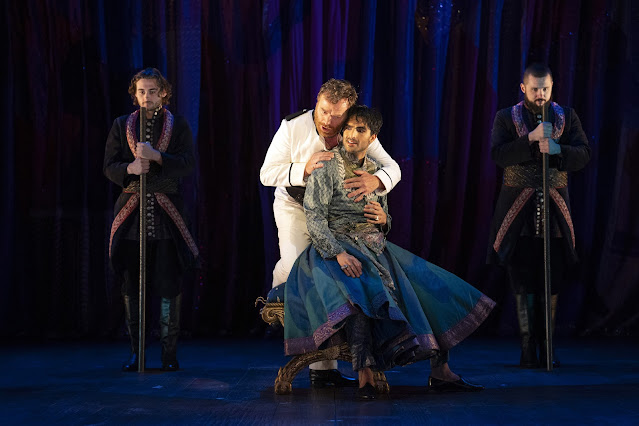 |
| Handel: Giulio Cesare – Luca Tittoto, Cameron Shahbazi – Glyndebourne, 2024 (Photo: © Richard Hubert Smith) |
In the pit, Laurence Cummings kept a firm hand on proceedings, allowing the drama to flow swiftly yet without seeming rushed. He allowed time for the soloists, including Cesare’s slightly overdone duet with the solo violin at the beginning of Act Two, yet the opera flowed too so that we never felt we spent too long dwelling on details. There was a dramatic thrust here too. And he encouraged a rich vibrant sound from the orchestra which verged on the lavish at times. There was nothing austere about these period manners, and it made one realise that at its height, Handel’s opera company fielded an admirably large orchestra.
Musically and dramatically this was a vivid evening in the theatre. So absorbing were the performances that you never felt the opera’s length, we were treated to richly layered drama. I have to admit that this is not my ideal production of Giulio Cesare and the opera’s tendency to playfulness was, at times, a bit too much for me, but I cannot deny that the whole was a richly rewarding evening at a Handel opera.
Never miss out on future posts by following us
The blog is free, but I’d be delighted if you were to show your appreciation by buying me a coffee.
Elsewhere on this blog
- Expressionism and rigour: soprano Claire Booth on recording Pierrot Lunaire and the importance of exploring Schoenberg’s songs – interview
- Something of a minor revelation: choral music by Giovanni Bononcini who was brought to England as Handel’s operatic rival – record review
- Pierrot Lunaire, Curlew River and a visit from the Hallé Orchestra: closing weekend of the 75th Aldeburgh Festival – concert review
- Youthfully engaging: a visually stylish new Rake’s Progress at the Grange Festival made us really care for about these characters – opera review
- A richly layered depiction of characters in all their fallibility: Monteverdi’s L’incoronazione di Poppea at the Grange Festival – opera review
- The Sea and Ships: the London Song Festival celebrates the first Shipping Forecast to be broadcast on British radio – concert review
- Much more than a piece of history: Roderick Cox conducts Shostakovich’s Symphony No. 10 at the Royal Academy of Music – concert review
- Music like no other: Icelandic composer Gudmundur Steinn Gunnarsson’s Stífluhringurinn – record review
- New colours in old sound worlds: the Portuguese duo, Bruno Monteiro & João Paulo Santos in Elgar, Debussy, Ravel & more – record review
- Time remembered: the 75th edition of the Aldeburgh Festival lovingly recreates the opening night of 1948 Festival – concert review
- Home










